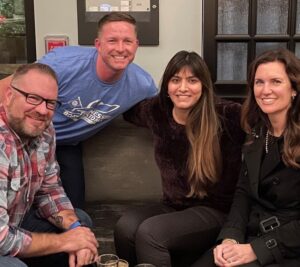By Arial Struthers
Vanderbilt University acquired Tennova Healthcare-Lebanon in Wilson County in 2019, renaming the facility Vanderbilt Wilson County Hospital (VWCH). Three employees – Traci Pope, Director of Community Relations, Jeremy Donegan, Certified Registered Nurse Anesthetist (CRNA), and Dr. Scott Frankenfield, Chief of Staff and Director of Emergency Medicine, all graduated in the Master of Management of Healthcare (MMHC) Class of 2021. Below, the healthcare professionals discuss the impact the program has had on their work.

(From left to right) Dr. Scott Frankenfield, Jeremy Donegan, colleague Dr. Safia Salaria, and Traci Pope
Traci Pope’s interest in the MMHC degree was initially piqued by “the precisely designed curriculum developed by Vanderbilt specifically for healthcare professionals seeking to further their skill set.” She was drawn to Vanderbilt MMHC by the broad applicability of the degree in healthcare. “What is really unique about this program is the strategically diverse cohort working together to gain additional business skills to advance our careers as well as the institutions we each represent,“ says Pope.
Pope had a desire to improve upon her business and leadership skills, 2 tools she credits Vanderbilt’s program with providing her.
“I’m very honored to have completed the advanced degree from Vanderbilt Owen Graduate School of Management. Knowing Vanderbilt values education, this program was a perfect fit for me. As our hospital grows, I expect my department to grow with it. The personal development has helped me identify strengths and challenges to gain new insight to improve communication and grow my leadership skills, “ Pope said.
Jeremy Donegan is the first CRNA to complete the Master’s of Management in Healthcare program at Vanderbilt Business. For Donegan, the degree was the “missing piece I needed in order to educate myself in the business of healthcare and use that knowledge to add value for the community I serve.”
Donegan cites the opportunity to develop hard and soft skills as major benefits of the program. “A strength of MMHC is that it simulates real world application of managing teams and personalities to accomplish a goal,” he said. “There’s a lot of truth to the statement of learning how to ‘play in the sandbox.’
“Prior to this program, I had little experience with how to break down financial statements. Knowing what constitutes a good investment and more importantly recognizing a bad investment as you can imagine is extremely valuable. This program taught me the hard skills of how to understand those statements and how to present the key data points for healthcare financial decision making projects.”
Dr. Scott Frankenfield, who spent much of his career as a physician leader, echoes Donegan’s sentiments. With the majority of his education and training focused on medicine, he felt he was lacking in business skills.
“As I advanced in my career, I felt like I was missing certain skills that prevented me from growing into more of a physician executive,” Frankenfield said. “The MMHC program allowed me to gain real-world knowledge in the business of medicine and also skills for improving how I lead teams and organizations. It gave me the confidence to know that, in addition to my medical training and leadership experience, I now have the tools to successfully navigate a career pivot into healthcare administration.”
Both Pope and Donegan agree that going through the program with 2 colleagues made the experience easier and has brought them closer together as peers.
“Going through a time-intensive program such as the MMHC program, it doesn’t take much to get discouraged by all the assignments,” Donegan said. “As both colleagues and classmates, we had the advantage of being able to work alongside each other and understand all the stressors of providing healthcare during a pandemic, academic requirements, and being a parent/spouse. I consider myself very fortunate to share my experience with Scott and Traci.”